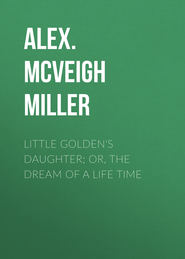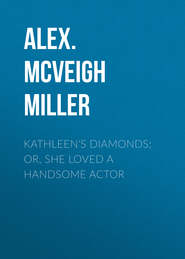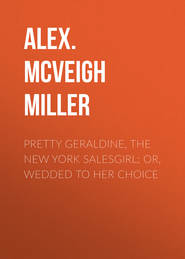По всем вопросам обращайтесь на: info@litportal.ru
(©) 2003-2024.
✖
Lancaster's Choice
Автор
Год написания книги
2018
Настройки чтения
Размер шрифта
Высота строк
Поля
"I do not understand you," he replied, coldly.
"You do not? Yet you must have known that I would be surprised. You knew I expected a child. You must have supposed that I would not care to have such a girl—an adventuress, perhaps—or, may be, a low concert or saloon singer—who can tell?—here at Lancaster Park."
The angry flash of his eyes did not escape her keen gaze. She had spoken with a deliberate purpose.
"Lady Lancaster, I do not think any one but yourself would dare say such things of Miss West," he said, hotly.
"Dare? Why not? What do you know to the contrary?" sneered the evil old woman.
"I know Miss West herself; no one who knows her would believe her to be an adventuress. She is a pure, simple, and true-hearted maiden," he answered, steadily.
"Ah! so you are interested in her? I thought as much," declared Lady Lancaster, violently. "This, then, is the secret of your indifference to Lady Adela. You have conceived a preference for this low-born, impertinent girl. But beware, sir, how you trifle with me. Remember my conditions."
Flushing to the roots of his hair, Lancaster neither affirmed nor denied her accusations. He sat gazing at her in proud silence.
"Answer me one thing," she stormed. "Do you intend to marry Lady Adela?"
"I have not made up my mind yet," he answered, coldly.
"Do you ever expect to do so?" she sneered. "You have been acquainted with Lady Adela long enough, I think, to tell whether you are pleased with her or not."
"It is scarcely a week," he said.
"Do you want more time?" she asked.
"Yes," he replied.
"How much?" she inquired.
"The utmost limit your liberality will allow me."
Lady Lancaster reflected for a moment, with her head on one side, like some brooding bird of evil omen.
"Very well," she said. "You shall not say I was impatient with you. Lady Adela will stay with us a month yet. You shall have the whole of that time to make up your mind, and then you must give me your answer. I can not believe that you are fool enough to let it be an unfavorable one."
"Thank you," he replied, with a bow.
"You need not thank me for nothing," sharply. "Of course I know you will have more sense than to refuse twenty thousand a year, unless," sneering, "you mean to become a suitor for the hand of that West creature."
Stung to retaliation, he answered:
"Miss West can boast a suitor more eligible than myself in point of that 'filthy lucre' you hold so dear."
She started, and gave him a keen glance.
"Whom?"
"Lieutenant De Vere."
"No!" she cried.
"Yes," he answered. "Why should you look so surprised? He was our compagnon du voyage. He admired Miss West very much, and he confided to me his intention of winning her, if possible, for his wife."
"His family will not allow him to throw himself away on that girl," she cried.
"He is quite independent of his family, and he will not be slow to avail himself of the advantage."
"Happy mortal! You would like to exchange places with him, no doubt?" she sneered.
"I could wish, certainly, that I were as fortunate as my friend," he replied.
She glared at him a moment, and then asked, curiously:
"Is the girl in love with De Vere? Pshaw! what would love have to do with it? I mean, will she accept her wealthy suitor?"
"She will if she is worldly wise," slowly. "But I can not tell. I do not know Miss West well enough to decide what she would do in a given case."
"Of course she will accept him. She is sharp enough, and such a girl as she is—poor and lowly born—would not be slow to jump at such a chance," said the dowager, coarsely. "If I had known that Lieutenant De Vere was so silly, I should not have invited him here. I would have had nothing to do with him. But he will be here to-night."
"He is here now. He went to his dressing-room an hour ago," Lancaster said, coolly. "I think he will express a desire for a private interview with you this evening. It is rather embarrassing to him to have to ask your permission to woo his lady-love in the housekeeper's rooms, yet such is his avowed intention. If I—" he paused and bit his lip to keep back the impatient avowal.
"If you—what? Go on, my lord—let me hear what wonderful thought was prefaced by that 'if.'"
"Only this—if I were master in my own house instead of a guest, it should be otherwise. My friend should not be insulted."
"You would bring that creature into the drawing-room to receive his addresses?" she hissed.
"Yes," he replied.
"Then you will not do so while I am the mistress of Lancaster. If he chooses to have such low tastes, it is not for me to indulge him in them. If he must woo the housekeeper's niece, he may woo her in her proper place," cried Lady Lancaster, indignant at his defense of his friend's misplaced admiration, and secretly jealous of the beautiful girl's influence.
What if Lancaster, too, had been bewitched by that fair, piquant face and luring smile?
A sudden thought came to her.
After all, perhaps, it were best for her plans that De Vere should have his way. Who could tell what folly might get into Lancaster's head?
She looked at him thoughtfully.
"Perhaps I was hasty," she said. "But I had a shock to-day when I first saw the girl, and—she was very impertinent to me. Is it your wish, Clive, that I should put no obstacle in the way of Lieutenant De Vere's designs?"
He bowed silently. A swift, sharp, cruel pang of jealousy tore through his heart as he did so. "To see her another's—Oh, God! it would be harder than death!" he said to himself, and yet there was no hope for him. Why should he stand in another's light?
Her keen eyes detected the shadow on his face, and she interpreted it aright. She was frightened at the danger that had been so near her, unknown and unsuspected all this while.
"I must remove the temptation from him as soon as I can," she thought, anxiously.
CHAPTER XXXII











